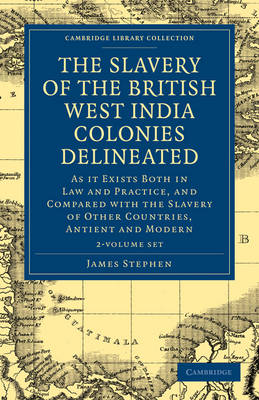Cambridge Library Collection - Slavery and Abolition
2 primary works • 5 total works
Volume 1
The lawyer and leading abolitionist James Stephen (1758-1832) published Volume 1 of The Slavery of the British West India Colonies Delineated in 1824. The volume is an exposure of the cruel and oppressive legal system of slavery in the British West Indies. The work explores the origin of nineteenth-century colonial slave laws, the legal status of individual slaves, the legal relations between slaves and their masters, and the policing and governance of slave populations. In each chapter Stephen exposes the cruelty and inhumanity behind the West Indian slave laws. Stephen had been the legal mastermind of the Slave Trade Act of 1807, which abolished the slave trade in the British Empire but not slavery itself. This important work was influential in directing public opinion against slavery and helped lead towards the 1833 Slavery Abolition Act. It is a key text in the progression of the nineteenth-century abolitionist movement.
Volume 2
The lawyer and leading abolitionist James Stephen (1758-1832) published Volume 2 of The Slavery of the British West India Colonies Delineated in 1830. The volume is an exposure of the cruel and oppressive practice of slavery in the British West Indies. It investigates the living conditions, feeding and clothing of slave populations; the brutal practices, such as 'slave driving', involved in forcing labour; and, by comparisons of forced and free labour, argues for the complete abolition of slavery. Stephen had been the legal mastermind of the Slave Trade Act of 1807, which abolished the slave trade in the British Empire but not slavery itself. This important work was influential in directing public opinion against slavery and helped lead towards the 1833 Slavery Abolition Act. It is a key text of the nineteenth-century abolitionist movement and is vital for understanding the arguments and debates that led to abolition.
The Opportunity; Or Reasons for an Immediate Alliance with St. Domingo
by James Stephen
Published 27 January 2011
James Stephen (1758-1832) was a British lawyer and slavery abolitionist. After qualifying for the bar at Lincoln's Inn in 1782 Stephen sailed for St Kitts in 1783. The atrocities committed against slaves which he witnessed in the West Indies converted him to the abolitionist cause, and after his return to England in 1794 he campaigned on behalf of the abolition movement. This volume, first published in 1804, contains Stephen's discussion of Britain's political choices following the successful Haitian Revolution (1791-1804). Before the Revolution, Haiti was one of the wealthiest colonies in the Caribbean, which Britain had attempted unsuccessfully to acquire by force. Stephen explores the complex political situation created by Haiti's declaration of independence, and advocates for Britain to acknowledge Haiti as a sovereign state. Stephen's thorough assessment of Britain's political choices and their potential impact provides valuable insights into contemporary trade and political motivations surrounding Haiti.
Written as four public letters, this book condemns the intention by the French to reinstate older slavery practices on its colonies in the West Indies. James Stephen (1758-1832) was a lawyer who, after moving to St Kitts with his family to earn a living, became a supporter of the abolition movement. On his return to London in 1794, Stephen became involved with the anti-slavery group, the Clapham Sect, whose members included William Wilberforce, and with whom Stephen developed a lifelong friendship. Elected as a Member of Parliament in 1808, Stephen contributed to drafting legislation for slave registration on the island of Trinidad, which became a model for other slave colonies. Stephen believed that the reinstatement of older slavery practices on French colonies in the West Indies would lead to slave revolts, and have significant consequences for the neighbouring British colonies. This work was published in London in 1802.
The Slavery of the British West India Colonies Delineated 2 Volume Set
by James Stephen
Published 30 September 2010
The lawyer and leading abolitionist James Stephen (1758-1832) published this two-volume work between 1824 and 1830, exposing the cruel and oppressive legal system of slavery in the British West Indies. Volume 1 explores the origin of nineteenth-century colonial slave laws, the legal status and the situation between slaves and their masters, and the policing and governance of slave populations. Volume 2 investigates the living conditions and the brutal practices involved in forcing labour, building the case for the abolition of slavery. Stephen had been the legal mastermind of the Slave Trade Act of 1807, which abolished the slave trade in the British Empire. This important work was influential in directing public opinion against slavery and helped lead towards the 1833 Slavery Abolition Act. It is a key text of the nineteenth-century abolitionist movement and is vital for understanding the arguments and debates that led to abolition.



